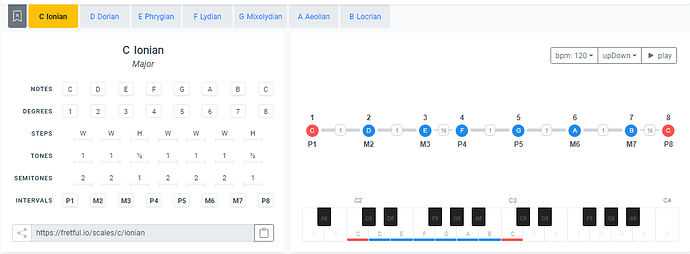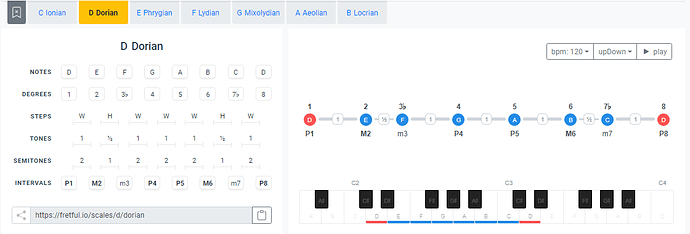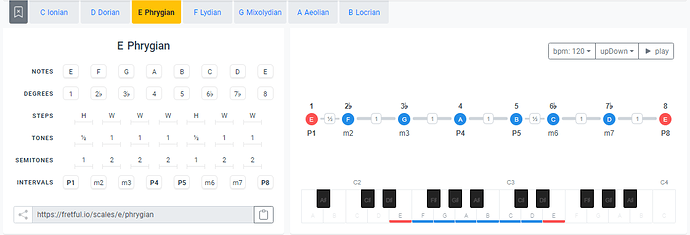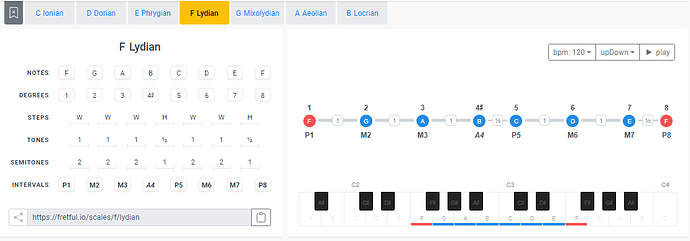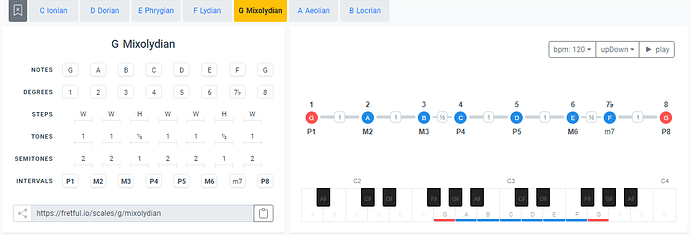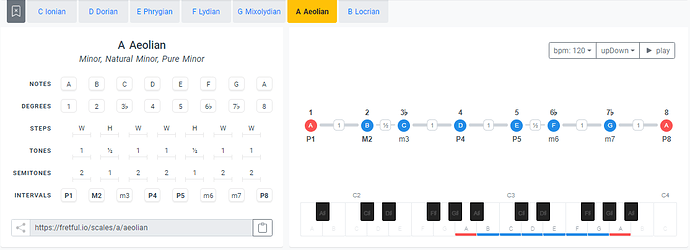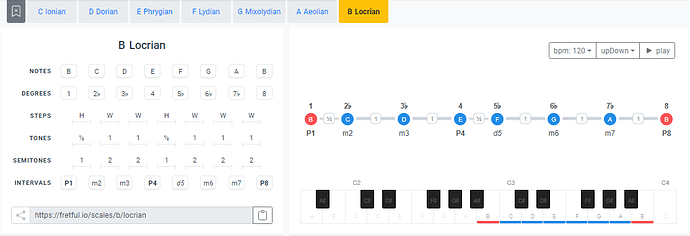Yes, I know what a diphthong is. ONLY because I just googled it (lol). And yes, I believe that is the case with my music. Bravo.
It’s interesting. So it kind of has to do with character of sound/emotional sound. You’ve probably heard Major is “happy” and minor is “sad”. So what happens in Modes is the mode tends to sharp or flat intervals. Lydian has the most sharps and is considered to sound bright (think simpsons). Phrygian and Locrian have lots of flats (Locrian considered almost unusable). Phrygian is often called the “Metal” mode. The signature sounds of the mode tend to be where the half steps occur. Phrygian has a flat 2, which has a metal sound (alternate between open E and the first fret and you can hear it, this is E Phrygian).
To go a little deeper, it’s playing all the notes in a scale, but at a different root note. C major (Ionian mode) and A minor (Aeolian mode) have the exact same notes. So A minor is the “relative minor” of C Major. E Phrygian also has all the same notes as C Major and A minor.
Easy way to learn. If you have C Major memorized up and down the fret board, fret the same notes you would but starting from a note different than C. When you get back to That root note, you just played a mode. For example.
C Major (Ionian mode). Notes are CDEFGAB
A Minor (Aeolian) notes are ABCDEFG
E Phrygian. Notes are EFGABCD
Sorry for essay, hope it helps. Play that and you can hear how the scale has a different mood/feeling even with the same notes.
Theory is just a tool. You can be a great player without it when your instincts and ear are just good. If you learn it it can open up doors where your ear and instinct hit a wall. I resisted theory for 20 years, and now am glad I have learned some.
I’m mostly just wondering if there is anything of a totally awesome nature out there even though I haven’t run into anything I can’t do yet. There are some things I just don’t like to do such as slap, that’s because I personally don’t like the sound it makes. and on a separate note, Lydian mode reminds me of the movie Psycho and I’m expecting someone to get gruesomely massacred in the shower with a hacksaw.
I do too.
Killer example.
Yes. I can confirm that things of a totally awesome nature are out there.
That’s the whole point ![]()
They are just different sets of intervals that evoke different “feels”. You’re already using two of them every day - the Major scale is the Ionian (I) mode, and the minor scale is the Aeolian (vi) mode.
Guitars kind of suck for this but on a piano keyboard this is super easy to visualize and play around with; C Major, aka C Ionian, is all the white keys starting at C, the I interval of C Major. A Minor, aka A Aeolian, is all the white keys starting at A, the vi interval if C Major.
Similarly, D Dorian is all the white keys starting at D, the CMaj ii interval; etc.
I use exactly two of these normally, just like you. Sometimes I use Mixolydian due to a few songs I like being in it. But that’s about it. Then again, I’m not a Jazz guy.
@Gorch, I view modes like this simplistic concept:
So, basically a mode is a scale within a scale starting from the nth degree.
To illustrate this (and again pulling the coal towards the sardine ![]() ), I’ll use the C major scale and its modes :
), I’ll use the C major scale and its modes :
https://fretful.io/scales/c/ionian
https://fretful.io/scales/d/dorian
https://fretful.io/scales/e/phrygian
https://fretful.io/scales/f/lydian
https://fretful.io/scales/g/mixolydian
https://fretful.io/scales/a/aeolian
https://fretful.io/scales/b/locrian
Notice the steps/tones progression between each mode. You’ll see they’re cycling
Thanks, Pam @PamPurrs . . . ![]() . . . glad to hear you say that. Whew!
. . . glad to hear you say that. Whew!
I’ve been feeling guilty because I haven’t worked on it as hard as you have! ![]()
Cheers
Joe
I guess it’s different for every person but I would even suggest thinking about if trying to learn the theory before getting the practical exercise might hinder some of us.
When I think about the B2B course the awesome thing was that most of the time the practical exercise came before the explanation of the theory behind it.
I am a person who likes to understand things and I know that habit can stand in the way of me learning the skills in practice.
Currently I am trying to imagine what would have happened if the B2B course would have started with the theory of what we play every time before we play it instead of how it is structured and I would probably have lost interest so anywhere I can I try to go the “do before analyse” approach. Of course there’s a catch-22 there, because how can I practice things I don’t know of? But regarding modes my personal approach is/would be to just play those up and down or find songs in which those modes are used instead of first trying to understand how and when they are used. Hear it in context first and maybe afterwards try to understand why it works the way it does and creates the feeling it does.
Agree completely. In the end, it’s all about making things that sound good. So I also feel that beginners should have plenty of time to initially have fun making things sound good and not overthink things; there’s enough to learn initially that theory is just going to confuse if it is brought in too early.
But that’s not really true for the really basic theory (i.e. this is a scale, these are the 12 semitones, etc) I guess.
More theory can wait until you are trying to analyze existing music or compose your own chord progressions. Before that I think it can be safely skipped. Get the major and minor scales (and their pentatonic subsets) down, have an understanding of what the notes are and how the intervals work, and leave the rest for later.
I’m mixed on this. I ignored theory and scales, played by feel and learned to play songs through tabs or my teacher showing me. And he tried to teach me theory, and I had a very loose grasp of Major and minor. I noodles around and used my ear to determine what sounded good and practiced technique a lot. Was resistant to theory, and not sure why. Guess I felt it would put my creativity in a box. I WAS WRONG! Singer kept hounding me to learn it. Finally scheduled a lesson. One hour. Teacher explained scales and modes to me in a way that clicked. My playing and creativity jumped immediately! Next thing I need to learn better is chords outside of 3rds and 5ths. It’s been a great journey, but I feel like I really set myself back by resisting theory so much, because once I got it it was this amazing new rabbit hole and ability!
Sure, it’s a mistake to resist it once you’re ready for it. And I am glad for what of it I know, and would like to learn more.
But that said, I also wouldn’t move the (very) basics Josh has in the course now any earlier than they already are, and the followup basic stuff like we are discussing here for scale modes - those are fine happening after the beginner course, IMO.
Oh for sure. Theory is deep too. The side of me that is conflicted is that sometimes the rules of theory get broken, and somehow it still works and sounds amazing. So in a way…theory CAN put you in a box if you let it. I’m not even close to an expert in theory. My knowledge is very limited. I can SLOWLY read sheet music. Timing signatures shut my brain off. Advanced chords I get to a degree but can’t apply. Chromatic scale and forming songs off of it is mind boggling. When to use 2s, 7ths, 6ths etc…it’s all a ton to grasp. But I’m interested now as opposed to resistant.
I can totally relate to that! It is what I did for most of my musical life!
Now, I am somewhere in between. For one thing, I am much more interested in theory than I was 20 years ago. But when the guitar player in our group comes with a new chord sequence, I usually start playing off the roots and then develop from there trusting my ears. BUT: now I also find myself going back to the bass lines I came up with (using my ears) and analyze them afterwards to understand why it sounded good to me and what is going on. For example, I noticed that I had used 9th without really realizing what they were.
Next time he comes with chords, I want to jot down some notes that should fit before I play anything and then see how that makes sense!
But, yeah, for the B2B, the level of theory was just perfect!
A ninth is just the next octave of the 2. Interesting as I understand this stuff, but am also slow to apply analyze it. Now that you mention it going to a 9 is more common than I expected lol.
It is… and it sounds good, too ![]()
Anf then there’s the difference between dominant seventh and major seventh chords, and how the dominant seventh is actually useful instead of just dischordant, and then how it is useful precisely because it is dischordant, and your mind gets re-blown 
So much to learn. Considering I was a keyboardist my knowledge is pretty lacking here, I really should study a lot more.
Has anyone tried Mark Smith’s (Talking Bass) new app for scales?
Not yet! I’m waiting for the Android version still. It looks promising and a nice benchmark for fretful
It’s those sardines again 
